This page intend to list bunch of scenarios for our SD-EWAN case, including the decomposed scenarios and the overall integrated scenario.
Decomposed scenarios
Decomposed Scenario A: Site-to-Site tunnel with static public IP address
In this scenario, both sites have static public IP address and setup a tunnel between sites. After the tunnel is established, the clients within the site should be able to ping the clients on the other side through the tunnel. The tunnel is authenticated through pre-shared key.
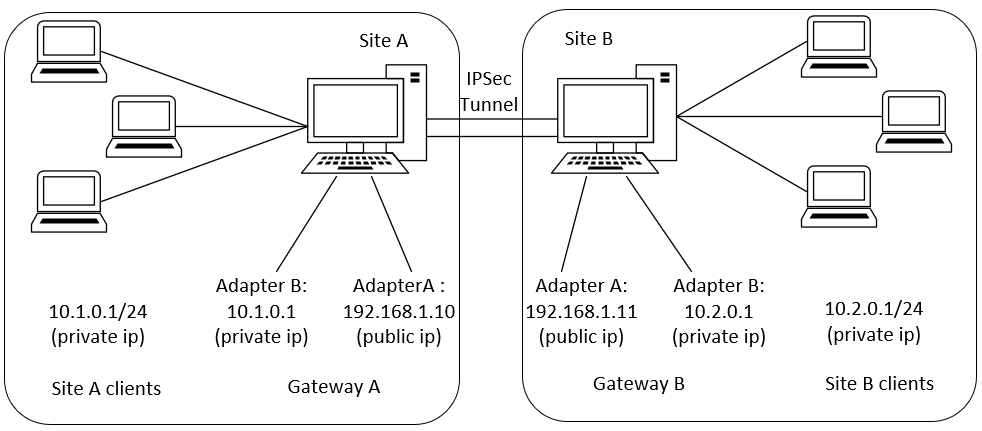
Scenario Description:
Tunnel between site A and site B
Suppose there are two sites A and B. A comes with the subnet 10.1.0.1/24, B comes with the subnet 10.2.0.1/24
Gateway for A is 192.168.1.10
Gateway for B is 192.168.1.11
A and B would like to establish a tunnel
10.1.0.1/24 == 10.2.0.1/24
CRs for the scenario
apiVersion: sdewan.akraino.org/v1alpha1
kind: IpsecProposal
metadata:
name: test_proposal_1
namespace: default
labels:
sdewanPurpose: cnf-1
spec:
encryption_algorithm: aes128
hash_algorithm: sha256
dh_group: modp3072
status:
appliedVersion: "1"
appliedTime: "2020-04-12T09:28:38Z"
inSync: True
apiVersion: sdewan.akraino.org/v1alpha1
kind: IpsecSite
metadata:
name: siteA
namespace: default
labels:
sdewanPurpose: cnf-1
spec:
remote: 192.168.1.11
authentication_method: psk
pre_shared_key: test123
crypto_proposal:
- test_proposal_1
connections:
- connection_name: connection_A
type: tunnel
mode: start
local_subnet: 10.1.0.1/24
remote_subnet: 10.2.0.1/24
crypto_proposal:
- test_proposal_1
status:
appliedVersion: "1"
appliedTime: "2020-04-12T09:28:38Z"
inSync: True
apiVersion: sdewan.akraino.org/v1alpha1
kind: IpsecSite
metadata:
name: siteB
namespace: default
labels:
sdewanPurpose: cnf-1
spec:
remote: 192.168.1.10
authentication_method: psk
pre_shared_key: test123
crypto_proposal:
- test_proposal_1
connections:
- connection_name: connection_B
type: tunnel
mode: start
local_subnet: 10.2.0.1/24
remote_subnet: 10.1.0.1/24
crypto_proposal:
- test_proposal_1
status:
appliedVersion: "1"
appliedTime: "2020-04-12T09:28:38Z"
inSync: True
Rest calls
Sites settings
GET /cgi-bin/luci/sdewan/ipsec/v1/sites
{
"sites": [ { "name": “siteA", "remote":"192.168.1.11", "crypto_proposal": "test_proposal_1", "pre_shared_key": "test123", "authentication_method": "psk", "connections": [ { "name": "connection_A", "type": "tunnel", "mode": "start", "local_subnet": "10.1.0.1/24", "remote_subnet": "10.2.0.1/24", "crypto_proposal": "test_proposal_1" } ] }, { "name": "siteB", "gateway":"192.168.1.10", "crypto_proposal": "test_proposal_1", "pre_shared_key": "test123", "authentication_method": "psk", "remote_identifier": "@moon.strongswan.org", "local_identifier": "@sun.strongswan.org", "connections": [ { "name": "connection_B", "type": "tunnel", "mode": "start", "local_subnet": "10.2.0.1/24", "remote_subnet": "10.1.0.1/24", "crypto_proposal": "test_proposal_1" } ] } ]
} |
|---|
Proposal settings
GET /cgi-bin/luci/sdewan/ipsec/v1/proposals
{ "proposals": [ { "name": "proposal1", "crypto_algorithm": "aes128", "hash_algorithm": "sha256", "dh_group": "modp3072" } ] } |
|---|
Decomposed Scenario B: Host-to-Site tunnel when the initiator requests an overlay IP
In this scenario, the initiator sends out a request to the responder(either a site gateway/remote host) which has a static public ip address(or dynamic pubic IP with static domain name) in order to setup a tunnel between. However, this time, the roadwarrior is also going to ask for a virtual IP that assigned by the responder. After the tunnel is established, the roadwarrior should be able to get an overlay IP and ping the clients on the other side through the tunnel. The tunnel is authenticated through pre-shared key.

Scenario Description:
Tunnel between site A and host B(Responder and Initiator)
Suppose there is one site A and one host B. A comes with the subnet 10.1.0.1/24.
Gateway for A is 192.168.1.10 which is a public ip address
Host B has no public address and want to request one from the peer(suppose the vip assigned is 10.3.0.12)
A and B would like to establish a tunnel
10.1.0.1/24 == 10.3.0.12/32
CRs for the scenario
apiVersion: sdewan.akraino.org/v1alpha1
kind: IpsecProposal
metadata:
name: test_proposal_1
namespace: default
labels:
sdewanPurpose: cnf-1
spec:
encryption_algorithm: aes128
hash_algorithm: sha256
dh_group: modp3072
status:
appliedVersion: "1"
appliedTime: "2020-04-12T09:28:38Z"
inSync: True
apiVersion: sdewan.akraino.org/v1alpha1
kind: IpsecSite
metadata:
name: siteA
namespace: default
labels:
sdewanPurpose: cnf-1
spec:
remote: %any
authentication_method: psk
pre_shared_key: test
crypto_proposal:
- test_proposal_1
connections:
- connection_name: connection_A
type: tunnel
mode: start
local_subnet: 10.1.0.1/24
remote_sourceip: 10.3.0.1/24
crypto_proposal:
- test_proposal_1
status:
appliedVersion: "1"
appliedTime: "2020-04-12T09:28:38Z"
inSync: True
apiVersion: sdewan.akraino.org/v1alpha1
kind: IpsecHost
metadata:
name: hostB
namespace: default
labels:
sdewanPurpose: cnf-1
spec:
remote: 192.168.1.10
authentication_method: psk
pre_shared_key: test
crypto_proposal:
- test_proposal_1
connections:
- connection_name: connection_A
type: tunnel
mode: start
local_sourceip: %config
remote_subnet: 0.0.0.0/0
crypto_proposal:
- test_proposal_1
status:
appliedVersion: "1"
appliedTime: "2020-04-12T09:28:38Z"
inSync: True
Rest calls
Sites settings
GET /cgi-bin/luci/sdewan/ipsec/v1/sites
{
"sites": [ { "name": "siteA", "remote":"%any", "crypto_proposal": "test_proposal_1", "pre_shared_key": "test123", "authentication_method": "psk", "local_identifier": "@moon.strongswan.org", "remote_identifier": "@sun.strongswan.org", "connections": [ { "name": "connA", "type": "tunnel", "mode": "start", "local_subnet": "10.1.0.1/24", "remote_sourceip": "10.3.0.1/24", "crypto_proposal": "test_proposal_1" } ] }, { "name": "hostB", "remote":"192.168.1.10", "crypto_proposal": "test_proposal_1", "pre_shared_key": "test123", "authentication_method": "psk", "remote_identifier": "@moon.strongswan.org", "local_identifier": "@sun.strongswan.org", "connections": [ { "name": "connA", "type": "tunnel", "mode": "start", "local_sourceip": "%config", "remote_subnet": "10.1.0.1/24", "crypto_proposal": "test_proposal_1" } ] } ]
} |
|---|
Proposal settings
GET /cgi-bin/luci/sdewan/ipsec/v1/proposals
{ "proposals": [ { "crypto_algorithm": "aes128", "hash_algorithm": "sha256", "dh_group": "modp3072" } ] } |
|---|
Decomposed Scenario C: Host to host tunnel
Setup a tunnel between the host who got assigned the virtual IP and another host with PIP.

Scenario Description:
Tunnel between host A and host B
Suppose there are two hosts A and B.
A has a public ip which is 192.168.3.1
B is a host which already get a vip 10.3.0.12
A and B would like to establish a tunnel
192.168.3.1/32 == 10.3.0.12/32
CRs for the scenario
apiVersion: sdewan.akraino.org/v1alpha1
kind: IpsecProposal
metadata:
name: test_proposal_1
namespace: default
labels:
sdewanPurpose: cnf-1
spec:
encryption_algorithm: aes128
hash_algorithm: sha256
dh_group: modp3072
status:
appliedVersion: "1"
appliedTime: "2020-04-12T09:28:38Z"
inSync: True
apiVersion: sdewan.akraino.org/v1alpha1
kind: IpsecHost
metadata:
name: hostA
namespace: default
labels:
sdewanPurpose: cnf-1
spec:
remote: %any
authentication_method: psk
pre_shared_key: test
crypto_proposal:
- test_proposal_1
connections:
- connection_name: connection_A
type: tunnel
mode: start
remote_sourceip: 10.3.0.12
crypto_proposal:
- test_proposal_1
status:
appliedVersion: "1"
appliedTime: "2020-04-12T09:28:38Z"
inSync: True
apiVersion: sdewan.akraino.org/v1alpha1
kind: IpsecHost
metadata:
name: hostB
namespace: default
labels:
sdewanPurpose: cnf-1
spec:
remote: 192.168.3.1
authentication_method: psk
pre_shared_key: test
crypto_proposal:
- test_proposal_1
connections:
- connection_name: connection_A
type: tunnel
mode: start
local_sourceip: 10.3.0.13
crypto_proposal:
- test_proposal_1
status:
appliedVersion: "1"
appliedTime: "2020-04-12T09:28:38Z"
inSync: True
Rest calls
Sites settings
GET /cgi-bin/luci/sdewan/ipsec/v1/sites
{
"sites": [ { "name": "hostA", "remote":"%any", "crypto_proposal": "test_proposal_1", "pre_shared_key": "test123", "authentication_method": "psk", "local_identifier": "@moon.strongswan.org", "remote_identifier": "@sun.strongswan.org", "connections": [ { "name": "connA", "type": "tunnel", "mode": "start", "remote_sourceip": "10.3.0.12", "crypto_proposal": "test_proposal_1" } ] }, { "name": "hostB", "remote":"192.168.3.1", "crypto_proposal": "test_proposal_1", "pre_shared_key": "test123", "authentication_method": "psk", "remote_identifier": "@moon.strongswan.org", "local_identifier": "@sun.strongswan.org", "connections": [ { "name": "connA", "type": "tunnel", "mode": "start", "local_sourceip": "10.3.0.12", "crypto_proposal": "test_proposal_1" } ] } ]
} |
|---|
Proposal settings
GET /cgi-bin/luci/sdewan/ipsec/v1/proposals
{ "proposals": [ { "crypto_algorithm": "aes128", "hash_algorithm": "sha256", "dh_group": "modp3072" } ] } |
|---|
Targeted Scenarios
Scenario A: Edge to traffic hub tunnel where inter micro-service communication across edges that attached to same traffic hub.
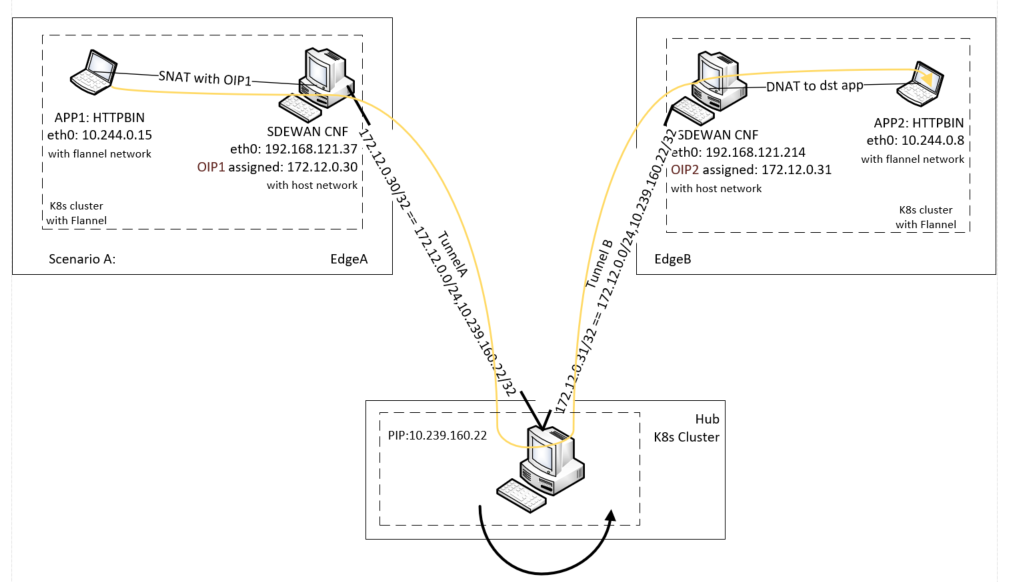
CR for sdewan cnf on edgeA:
apiVersion: sdewan.akraino.org/v1alpha1
kind: IpsecHost
metadata:
name: edgeA
namespace: default
labels:
sdewanPurpose: cnf-1
spec:
remote: 10.239.160.22
authentication_method: psk
pre_shared_key: test
crypto_proposal:
- test_proposal_1
connections:
- connection_name: connection_A
type: tunnel
mode: start
local_sourceip: %config
remote_subnet: 0.0.0.0/0, 10.239.160.22/32
crypto_proposal:
- test_proposal_1
status:
appliedVersion: "1"
appliedTime: "2020-04-12T09:28:38Z"
inSync: True
The CRs defined will then be interpreted into some IPSec configuration that could be recognized by Openwrt and then translate to Strongswan configs
Strongswan configs for sdewan cnf on edgeA:
conn siteA-connA
left=%any
right=10.239.160.22
leftsourceip=%config
rightsubnet=0.0.0.0/0,10.239.160.22/32
leftauth=psk
rightauth=psk
auto=start
keyexchange=ikev2
esp=aes192-sha1-modp3072
ike=aes192-sha1-modp3072
type=tunnel
CR on sdewan cnf on edgeB:
apiVersion: sdewan.akraino.org/v1alpha1
kind: IpsecHost
metadata:
name: edgeB
namespace: default
labels:
sdewanPurpose: cnf-1
spec:
remote: 10.239.160.22
authentication_method: psk
pre_shared_key: test
crypto_proposal:
- test_proposal_1
connections:
- connection_name: connection_A
type: tunnel
mode: start
local_sourceip: %config
remote_subnet: 0.0.0.0/0, 10.239.160.22/32
crypto_proposal:
- test_proposal_1
status:
appliedVersion: "1"
appliedTime: "2020-04-12T09:28:38Z"
inSync: True
The CRs defined will then be interpreted into some IPSec configuration that could be recognized by Openwrt and then translate to Strongswan configs
Strongswan configs for sdewan cnf on edgeB:
conn edgeB-connA
left=%any
right=10.239.160.22
leftsourceip=%config
rightsubnet=0.0.0.0/0,10.239.160.22/32
leftauth=psk
rightauth=psk
auto=start
keyexchange=ikev2
esp=aes192-sha1-modp3072
ike=aes192-sha1-modp3072
type=tunnel
CR on sdewan on hub:
apiVersion: sdewan.akraino.org/v1alpha1
kind: IpsecSite
metadata:
name: Hub
namespace: default
labels:
sdewanPurpose: cnf-1
spec:
remote: %any
authentication_method: psk
pre_shared_key: test
crypto_proposal:
- test_proposal_1
connections:
- connection_name: connection_A
type: tunnel
mode: start
local_subnet: 172.12.0.1/24,10.239.160.22/32
remote_sourceip: 172.12.0.1/24
crypto_proposal:
- test_proposal_1
status:
appliedVersion: "1"
appliedTime: "2020-04-12T09:28:38Z"
inSync: True
The CRs defined will then be interpreted into some IPSec configuration that could be recognized by Openwrt and then translate to Strongswan configs
Strongswan configs for sdewan cnf on hub:
conn tunnel
left=10.239.160.22
leftsubnet=172.12.0.1/24,10.239.160.22/32
rightsourceip=172.12.0.30-172.12.0.45
leftauth=psk
rightauth=psk
auto=start
keyexchange=ikev2
ike=aes192-sha1-modp3072
esp=aes192-sha1-modp3072
type=tunnel
Scenario B: Edge to Edge tunnels when micro-service communication happens across edges without involving hubs

CR on sdewan cnf on edgeA:
apiVersion: sdewan.akraino.org/v1alpha1
kind: IpsecHost
metadata:
name: edgeA
namespace: default
labels:
sdewanPurpose: cnf-1
spec:
remote: 10.239.40.42
authentication_method: psk
pre_shared_key: test
crypto_proposal:
- test_proposal_1
connections:
- connection_name: connection_A
type: tunnel
mode: start
crypto_proposal:
- test_proposal_1
status:
appliedVersion: "1"
appliedTime: "2020-04-12T09:28:38Z"
inSync: True
The CRs defined will then be interpreted into some IPSec configuration that could be recognized by Openwrt and then translate to Strongswan configs
Strongswan configs for sdewan cnf on edgeA:
conn edgeA-connection_A
left=%any
right=10.239.40.42
leftauth=psk
rightauth=psk
auto=start
keyexchange=ikev2
ike=aes192-sha1-modp3072
esp=aes192-sha1-modp3072
type=tunnel
CR on sdewan cnf on edgeB:
apiVersion: sdewan.akraino.org/v1alpha1
kind: IpsecHost
metadata:
name: edgeB
namespace: default
labels:
sdewanPurpose: cnf-1
spec:
remote: 10.239.160.22
authentication_method: psk
pre_shared_key: test
crypto_proposal:
- test_proposal_1
connections:
- connection_name: connection_A
type: tunnel
mode: start
crypto_proposal:
- test_proposal_1
status:
appliedVersion: "1"
appliedTime: "2020-04-12T09:28:38Z"
inSync: True
The CRs defined will then be interpreted into some IPSec configuration that could be recognized by Openwrt and then translate to Strongswan configs
Strongswan configs for sdewan cnf on edgeB:
conn edgeB-connection_A
left=%any
right=10.239.160.22
leftauth=psk
rightauth=psk
auto=start
keyexchange=ikev2
ike=aes192-sha1-modp3072
esp=aes192-sha1-modp3072
type=tunnel
Scenario C: Hub to hub tunnel when inter micro-service communication across edges that attached to different traffic hubs
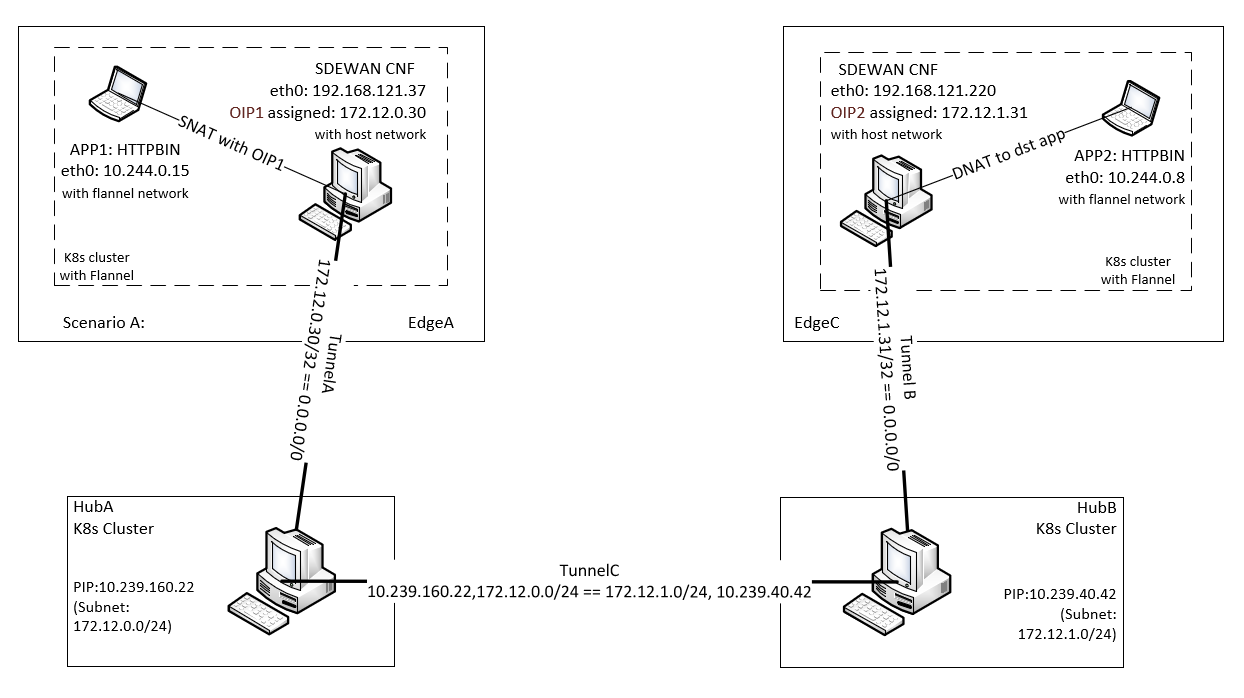
CR for sdewan cnf on edgeA:
apiVersion: sdewan.akraino.org/v1alpha1
kind: IpsecHost
metadata:
name: edgeA
namespace: default
labels:
sdewanPurpose: cnf-1
spec:
remote: 10.239.160.22
authentication_method: psk
pre_shared_key: test
crypto_proposal:
- test_proposal_1
connections:
- connection_name: connection_A
type: tunnel
mode: start
local_sourceip: %config
remote_subnet: 0.0.0.0/0, 10.239.160.22/32
crypto_proposal:
- test_proposal_1
status:
appliedVersion: "1"
appliedTime: "2020-04-12T09:28:38Z"
inSync: True
The CRs defined will then be interpreted into some IPSec configuration that could be recognized by Openwrt and then translate to Strongswan configs
Strongswan configs for sdewan cnf on edgeA:
conn edgeB-connection_A
left=%any
right=10.239.160.22
localsourceip=%config
rightsubnet=0.0.0.0/0,10.239.160.22/32
leftauth=psk
rightauth=psk
auto=start
keyexchange=ikev2
ike=aes192-sha1-modp3072
esp=aes192-sha1-modp3072
type=tunnel
CR for sdewan cnf on edgeB:
apiVersion: sdewan.akraino.org/v1alpha1
kind: IpsecHost
metadata:
name: edgeB
namespace: default
labels:
sdewanPurpose: cnf-1
spec:
remote: 10.239.40.42
authentication_method: psk
pre_shared_key: test
crypto_proposal:
- test_proposal_1
connections:
- connection_name: connection_A
type: tunnel
mode: start
local_sourceip: %config
remote_subnet: 0.0.0.0/0, 10.239.40.42/32
crypto_proposal:
- test_proposal_1
status:
appliedVersion: "1"
appliedTime: "2020-04-12T09:28:38Z"
inSync: True
The CRs defined will then be interpreted into some IPSec configuration that could be recognized by Openwrt and then translate to Strongswan configs
Strongswan configs for sdewan cnf on edgeB:
conn edgeB-connection_A
left=%any
right=10.239.40.42
localsourceip=%config
rightsubnet=0.0.0.0/0,10.239.40.42/32
leftauth=psk
rightauth=psk
auto=start
keyexchange=ikev2
ike=aes192-sha1-modp3072
esp=aes192-sha1-modp3072
type=tunnel
CR on sdewan on hubA:
apiVersion: sdewan.akraino.org/v1alpha1
kind: IpsecSite
metadata:
name: HubA
namespace: default
labels:
sdewanPurpose: cnf-1
spec:
remote: %any
authentication_method: psk
pre_shared_key: test
crypto_proposal:
- test_proposal_1
connections:
- connection_name: connection_A
type: tunnel
mode: start
local_subnet: 172.12.0.1/24,10.239.160.22/32
remote_sourceip: 172.12.0.30-172.12.0.45
crypto_proposal:
- test_proposal_1
status:
appliedVersion: "1"
appliedTime: "2020-04-12T09:28:38Z"
inSync: True
---
apiVersion: sdewan.akraino.org/v1alpha1
kind: IpsecSite
metadata:
name: HubA
namespace: default
labels:
sdewanPurpose: cnf-1
spec:
remote: 10.239.40.42
authentication_method: psk
pre_shared_key: test
crypto_proposal:
- test_proposal_1
connections:
- connection_name: connection_B
type: tunnel
mode: start
local_subnet: 172.12.0.1/24,10.239.160.22/32
remote_subnet: 172.12.1.1/24,10.239.40.42/32
crypto_proposal:
- test_proposal_1
status:
appliedVersion: "1"
appliedTime: "2020-04-12T09:28:38Z"
inSync: True
The CRs defined will then be interpreted into some IPSec configuration that could be recognized by Openwrt and then translate to Strongswan configs
Strongswan configs for sdewan cnf on hub:
conn HubA-connection_A
left=%any
leftsubnet=172.12.0.1/24,10.239.160.22/32
rightsourceip=172.12.0.30-172.12.0.45
leftauth=psk
rightauth=psk
auto=start
keyexchange=ikev2
ike=aes192-sha1-modp3072
esp=aes192-sha1-modp3072
type=tunnel
conn HubA-connection_B
left=%any
leftsubnet=172.12.0.1/24,10.239.160.22/32
rightsubnet=172.12.1.1/24,10.239.40.42/32
leftauth=psk
rightauth=psk
auto=start
keyexchange=ikev2
ike=aes192-sha1-modp3072
esp=aes192-sha1-modp3072
type=tunnel
CR on sdewan on hubB:
apiVersion: sdewan.akraino.org/v1alpha1
kind: IpsecSite
metadata:
name: HubB
namespace: default
labels:
sdewanPurpose: cnf-1
spec:
remote: %any
authentication_method: psk
pre_shared_key: test
crypto_proposal:
- test_proposal_1
connections:
- connection_name: connection_A
type: tunnel
mode: start
local_subnet: 172.12.1.1/24,10.239.40.42/32
remote_sourceip: 172.12.1.31-172.12.1.35
crypto_proposal:
- test_proposal_1
status:
appliedVersion: "1"
appliedTime: "2020-04-12T09:28:38Z"
inSync: True
---
apiVersion: sdewan.akraino.org/v1alpha1
kind: IpsecSite
metadata:
name: HubB
namespace: default
labels:
sdewanPurpose: cnf-1
spec:
remote: 10.239.160.22
authentication_method: psk
pre_shared_key: test
crypto_proposal:
- test_proposal_1
connections:
- connection_name: connection_B
type: tunnel
mode: start
remote_subnet: 172.12.0.1/24,10.239.160.22/32
local_subnet: 172.12.1.1/24,10.239.40.42/32
crypto_proposal:
- test_proposal_1
status:
appliedVersion: "1"
appliedTime: "2020-04-12T09:28:38Z"
inSync: True
The CRs defined will then be interpreted into some IPSec configuration that could be recognized by Openwrt and then translate to Strongswan configs
Strongswan configs for sdewan cnf on hub:
conn HubB-connection_A
left=%any
leftsubnet=172.12.1.1/24,10.239.40.42/32
rightsourceip=172.12.1.31-172.12.1.35
leftauth=psk
rightauth=psk
auto=start
keyexchange=ikev2
ike=aes192-sha1-modp3072
esp=aes192-sha1-modp3072
type=tunnel
conn HubA-connection_B
left=%any
leftsubnet=172.12.1.1/24,10.239.40.42/32
rightsubnet=172.12.0.1/24,10.239.160.42/32
leftauth=psk
rightauth=psk
auto=start
keyexchange=ikev2
ike=aes192-sha1-modp3072
esp=aes192-sha1-modp3072
type=tunnel
Overall scenarios
Here shows the overall scenario we want to achieve in the ICN SDEWAN case.
The first step would be the edge initialization. The edges will try to connect to the central Secure WAN hub through the IPsec tunnel. There could be different scenarios containing the decomposed ones listed above:
(a) Initiator to Responder tunnels where there is edge one side with public IP address(or dynamic pubic IP with static domain name). Later, using DNAT to deliver the information to pods inside the cluster.
(b) Initiator to Responder tunnels to get overlay IP address, where the edge initiator don't have public IP address. Later, using DNAT to deliver the information to pods inside the cluster.
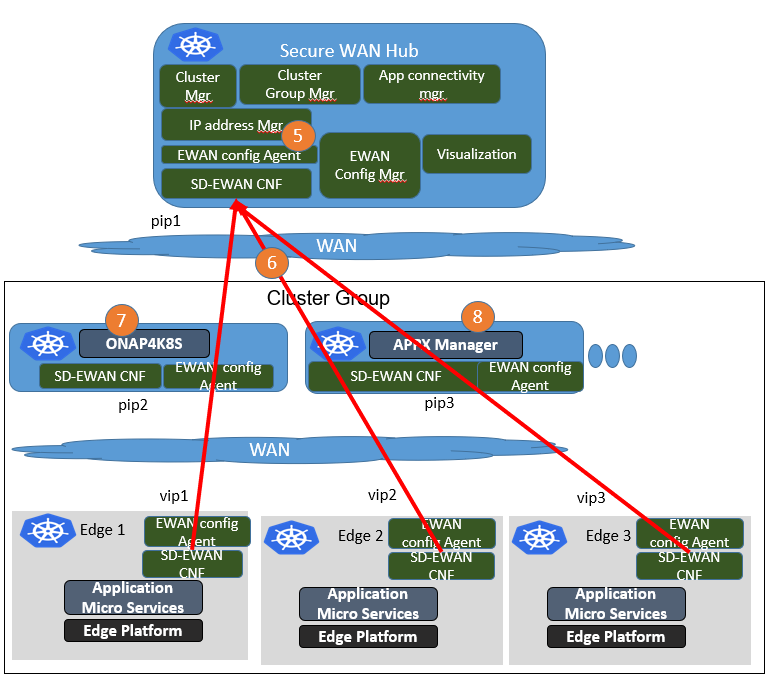
Next, the edges would use the virtual IPs/public IPs to setup IPSec tunnels with other clusters. In some cases, they need to go through the SD-EWAN CNF inside the Secure WAN Hub as Spoke and Hub to communicate with each other.
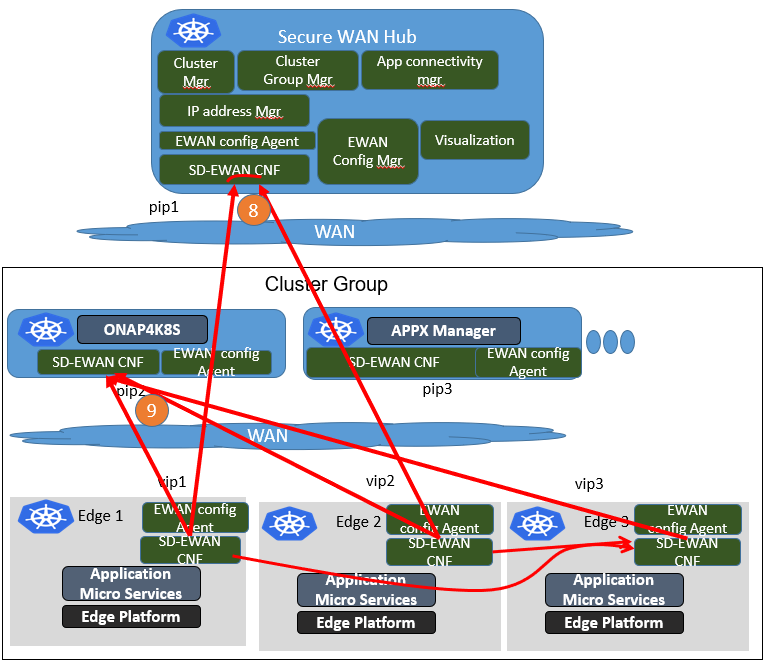








3 Comments
Kuralamudhan Ramakrishnan
Srinivasa Addepalli
Ruoyu Ying and Huifeng Le
Did you get chance to try the scenario using existing OpenWRT configuration? If so, can you give me confidence for this scneario.
Scenario:
Test:
Once above is proven,
Srini
Srinivasa Addepalli
Ruoyu Ying and Huifeng Le , please do send the test results.